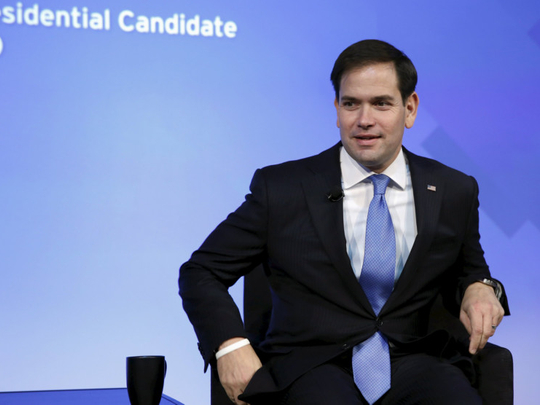
For Republican presidential contenders challenged by the media, the go-to answer has become a claim of victimhood: You are biased against us. As Marco Rubio put it at the CNBC debate last month: “The Democrats have the ultimate Super PAC [Political Action Committee]. It’s called the mainstream media.”
Are media outlets really biased against Republican candidates? One of the most careful studies, by Matthew Gentzkow and Jesse Shapiro of the University of Chicago, doesn’t find much evidence of that. Its central conclusion is that readers have a strong preference for like-minded news and that newspapers tend to show a slant in a direction that is consistent with the preferences of their readers.
With respect to television broadcasters, the evidence remains ambiguous. But Republicans who think that the media are biased against them might want to consider a striking empirical finding: Whatever their beliefs, political partisans have long tended to see, and to complain loudly about, media bias.
In short, people are biased about bias.
For more than 20 years, researchers have identified a phenomenon called “hostile media perception”, which means readers and viewers are inclined to think that journalists are biased against their particular point of view. People with strong convictions show a remarkably consistent tendency to conclude that the media’s presentation is skewed against them. This is true whether the issue involves football teams, genetically modified organisms, labour disputes, animal rights, climate change or the Middle East.
Political partisans see bias even when news coverage really is neutral, according to Colorado State University’s Cindy Christen and her coauthors. Rutgers University’s Lauren Feldman finds that partisans show a kind of “bias against bias”, seeing far less bias in opinionated news sources with which they already agree.
Extreme beliefs
For presidential primaries, where activists are especially important, here’s an especially important finding from Christen and her coauthors: As people become more involved with the particular topic, they become a lot more likely to complain about media bias. The more you know and the more you care, the more bias you’re going to see.
Hostile media perception is nothing new, but on the Republican side it has been intensifying. Like-minded people, listening mostly to one another, tend to become both more confident and more extreme in their beliefs.
Within Republican echo chambers, claims of media bias have become so widespread that they are increasingly taken as gospel. (Democrats have their own echo chambers, of course, but they tend to involve policy issues, such as the minimum wage and the Keystone pipeline, rather the media.)
The empirical findings don’t show that Republican claims about media bias are wrong. People who are predisposed to find bias might still be right that it exists. But the evidence of hostile media perception suggests that even if such a bias is real, the candidates are probably exaggerating it.
Is that a problem? As a matter of politics, it may be smart strategy to complain about media bias when pressed to respond to hard questions about climate change, immigration reform, or the debt limit. But any such complaints are a disservice to the voters; they are evasive, even cowardly. At its best, American conservative thought represents a politics of ideas, not victimhood. It offers answers to substantive questions — not attacks on those who ask them.
— Washington Post
Cass Sunstein is director of the Harvard Law School’s programme on behavioural economics and public policy.










